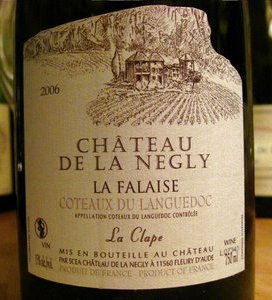Recently I was introduced to the Coteaux du Languedoc, or the western half of the Languedoc region. Those well-informed people at http://www.marquis-wines.com/ were kind enough to show me the ropes (as it were) and make my acquiantance with several decent bottles in the $20 to $30 range.
Now that I have had the opportunity to study further, I will amend my earlier comment about the Languedoc and the Coteaux du Languedoc being different... firstly the entire area is no longer known as the Languedoc, it is the Languedoc-Rousillon. As well, the Coteaux du Languedoc is now known as the Languedoc. Confusing? You betcha. Try explaining that on an exam!
So here I am, studying for an upcoming exam, tasting many wines from the Coteaux du Languedoc (whatever) and trying my darnedest to get a sense of the place. Here is what I've tasted so far...
Chateau Saint Martin de la Garrigue
2008 Bronzinelle
- please read review dated Weds 22 Dec
- after decanting for several hours, my review stood the same. Excellent wine for the money and drinks above its price
2008 "Les Garrigues" by Domaine Clavel
terroir de la Mejanelle
about $25 **EXCELLENT VALUE**
52% Syrah, 26% Mouvedre, 22% Grenache
- visual: deep ruby core with slightest cherry rim
- nose: moderate+ intensity; youthful; somewhat layered; red berries (cherry, raspberry), oak, funky - earthy terroir (some would call this barnyard or even merde-de-poulet), spicy peppery finish
- palate: 0 dryness, moderate+ acids, moderate+ slightly grippy and green tannins, moderate body, moderately intense flavors; youthful; somewhat layered; leathery oak dominates (alot of new French oak I would guess), followed by red berries, the earthiness hits the palate solidly and sits there.... long length and very good balance, the alcohol is strong but balanced and not too hot
- conclusion: Very good wine that is already showing well, and with the strong presence of oak and fruit I would imagine that this still has some development left in it. Drinks best probably 2011-2014, and after that perhaps one runs the risk of having all that lovely baie rouges flavor die out
- pairs with: braised rabbit. I used to know a talented chef from Dublin who made braised rabbit with tomato & fresh thyme, then serve it over fresh farfalle pasta tossed in butter. So simple. So ridiculously good that 20 years later I can still taste it. 1+1=yum
2006 Chateau de la Negly, La Clape
La Falaise (Coteaux du Languedoc)
$43 **BUY THIS NOW**
- visual: fully intense inky black-purple core with slight cherry/brick rim
- nose: fully intense; youthful showing slight age; layered; bright fresh red berries burst on the nose with cherry & raspberry from the Grenache, followed by a spicy pepperiness which is Syrah... leathery oak is a rich background from the new French oak (50% for 12 months), darker berries come through at the end with some slight heat from the alcohol and a dustiness from the terroir
- palate: 0 dryness, moderate- acids, moderate+ soft supple tannins, moderate+ rich creamy body, moderately intense flavors; showing some age; layered; surprisingly it is the terroir that dominates the palate: dry dusty earth still full of richness, red and black berries come in with a rush of flavor, and at the end is a beautifully balanced oak structure. Incredibly well balanced for $40, great structure and length. Drinks far above its price.
- conclusion: These people know their land and their grapes. A brilliant wine. I know someone who said this could easily be an $80 wine if it weren't from the Coteaux du Languedoc... I don't think he meant it as an insult. If this were from Chateauneuf du Pape.... yea. I would pay $80 for it and feel justified. Power, elegance and richness.
- Pairs With: venison scallopini with a fresh thyme demi-glace with the barest hint of chevre cheese in it... steamed carrots tossed in wildflower honey... the slight gamey qualities of the wine will play well against wild meats and the rich acids and tannin crave a bit of fat
 |
| Chateau Negly |
My thanks again to http://www.marquis-wines.com/ and http://www.justgrapeswine.com/ for being so free and easy with their accumulated knowledge. Its said, that when a wine it made well, it ends up giving a sense not only of the land it was made on - but of the winemaker as well. I believe, after almost a year of school, after reviewing over 700 wines and writing over 100 articles, that perhaps I am starting to get the barest sense of that.
Whether it be a $10 bottle or a $100 bottle (or higher!), the wine does tell a story, if it's made well. I feel honored, that so many people in the industry are allowing me to bumble my way through the long process that it is to understand wine. Then I feel doubly honored, when I taste a wine and truly can sense the vignerons *(winemakers) efforts. Its a beautiful thing, really, that someone on the other side of the world could have worked so hard last year or 5 years ago or 25 years ago - so that tonight I could have a special moment of peace.
It's a kinda magic.
CIN CIN !!! SLAINTE !!! CHEERS !!!






















